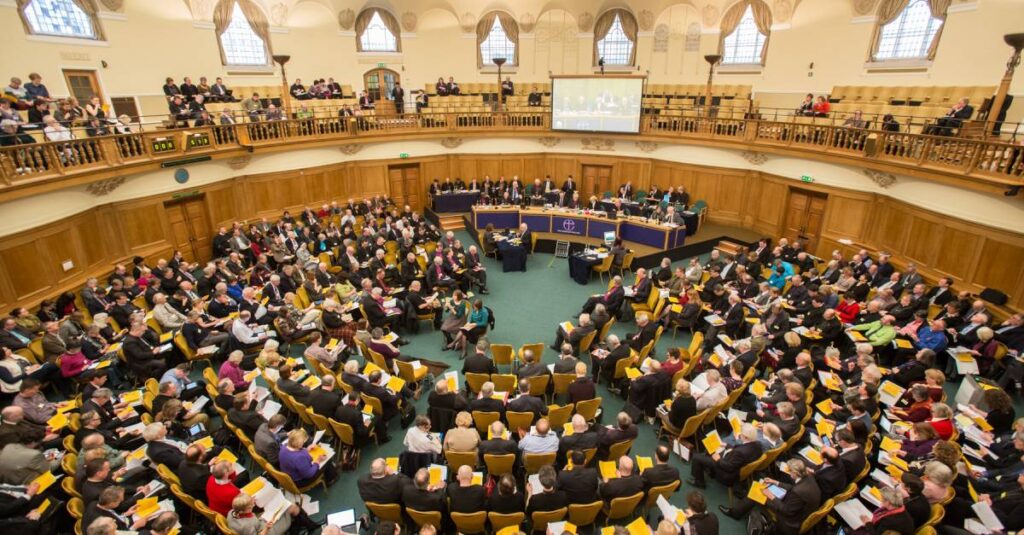by Jonathan

I hope readers will have a look at Jonathan’s original article which vividly describes the vulnerability and powerlessness of a junior member of the clergy when things go wrong. This blog is a follow-up to the original story, one and describes the continuing effect of an NDA issued by the Church. This, he believes, acted as a way of trying to extinguish a significant section of his life. What has come over in both articles is the impossibility of receiving a proper hearing if those set over you have come to a determination of your guilt, incompetence or whatever puts you on the edge of the institution. Jonathan, Anne-Marie Ghosh, Fr Griffin and John Brassington have all experienced with many others having to face the debilitating power of a strong institution determined to protect itself and its reputation.
Three years ago I wrote a blog post sharing my experience of an NDA in the Church of England (https://survivingchurch.org/2022/07/22/my-experience-with-an-nda-in-the-church-of-england/) This shared something of the experience, still fresh in my memory, and the events as they happened.
It has now been three years since then and a lot has happened. I have spent the majority of that time in therapy working through the experience itself alongside all that it unearthed, exposed and irritated. I have also rebuilt a new life for my family separate to the CofE. Amidst all of this I have spent a substantial amount of time reflecting and soul searching to try and make sense of this experience and what it has taught me. Attempts to understand what happened, and how I can close this chapter and walk boldly into my future.
A term I heard thrown around a lot in the CofE is that of ‘lessons learnt’, a term I have come to despise! The way I have heard it used amounts to something to the effect of:
‘Something uncomfortable and/or embarrassing has occurred that we don’t want to admit to, or properly and robustly address, so instead we’ll reframe it as an opportunity for learning by producing a document outlining what we might do differently in the future to avoid taking any real accountability for the harm done or actually remedy it in anyway.’
So with that in mind, I want to take this phrase – that rubs me up the wrong way – and use in a more genuine way to share some of the lessons I have indeed learned from going through, processing and recovering from this ordeal.
- It’s not really about me
As I’ve done the hard work in therapy and been empowered with tools and understanding in post cult counselling, it’s become increasingly apparent that my experience has so little to do with me. Or, to put it another way, all that happened to me wasn’t personal. If you said this to me at the time I would have scoffed and laughed you out the room! It felt immensely personal and even targeted! While the effects and impact were deeply personal and far reaching, I can now see how I was simply incidental to the deeper systemic dysfunction within the CofE. I see how various actors were simply following their programming and conditioning to ‘protect’ the institution, safeguarding reputation and those with power.
This doesn’t make it ok, but it does re-frame it for me. It feels different to see that the problem is not me, but the ugly beast that is the structures and hierarchy of the CofE following their core values. It makes it easier to walk away and cut all ties having seen the ugly face that had been kept hidden from me until that moment. But for me one of the core causes of this dysfunction is…
- The unaccountable power of Bishops
Three years on this is one of the core issues I see in regard to the great harm caused by the CofE. My experience made this unaccountable power very tangible. This can sometimes feel like a secret hidden in plain sight. How many roles and processes contain ‘bishop’s advisor(y)’ in the title? This is strictly correct. A bishop has the executive power to do whatever they want without having to justify their decision to anyone else. All anyone else can do is advise!
The ordination selection process is a good case study. The Bishop’s advisory panel is just that, advisory. The panel can only make a recommendation that the Bishop can chose to accept or ignore. Same is true during theological training. Taking it a step further, a Bishop can forego any of this and ordain someone, bypassing selection and training completely. There was an example of this in my previous diocese, which was often the talk of clergy gossip. Bishops wield a scary amount of power over people’s lives and futures and this is painfully apparent during selection, training and curacy.
This became poignant for me, when the Bishop ignored the recommendation that I had passed my curacy assessment and instead chose not to sign me off. This makes it very hard, if not impossible, for me to get another post in the CofE. He didn’t have to justify this to anyone else or provide much of a case. It was done behind closed doors without standardised processes, accountability or proper process of appeal.
This level of unaccountable power wouldn’t be acceptable in any other workplace or organisation, why is it acceptable in the Church of England?
How do they get away with it and keep it on the down low? Well…
3. The use of settlement agreements to silence and cover up
In the past three years I have signed a settlement agreement and an NDA in the corporate setting. However, they were very different to the one the CofE offered me.
The NDA related to sensitive business information that needed to be kept confidential during an investigation. I was required to sign the NDA in order to continue to handle this sensitive information in my day-to-day job. It made no claim to anything that had happened to me or was my own personal information. This is how NDAs should be used. To protect data belonging to a business, not to cover up wrongdoing. Changes in law should better enforce this going forward preventing unethical use of NDAs to cover up and protect failure and shortcomings of those in power.
My CofE issued NDA made everything I had done in my 4 years of curacy confidential including material of my own creation. It prevented me speaking of what had happened to me first hand and hence sharing my story. In essence, it tried to take ownership of my lived experience and buy it from me. They tried to take from me that which is rightfully mine having lived and breathed it in painful Technicolor. They wanted to condemn me to living the rest of my life bound to lie about a significant period of my life. It was this dehumanizing aspect that pushed me into the realm of suicidal ideation as I contemplated signing the NDA. This was the chief reason I didn’t sign it. It felt like giving them parts of myself they had no right to claim.
I have also since been offered a settlement agreement when being made redundant in a corporate setting. What was most striking was that this agreement protected both me and my former employer from negative comments. In contrast my CofE issued settlement agreement protected anyone I had ever had any dealings within my curacy from negative comment regardless of its factuality and offered me zero protection in return. As above, they were silencing me, taking my story, my lived experience from me. For what? The initial offer was less than my stipend till the end of my license. I gained more money by not signing and seeing out my license.
In hindsight the CofE settlement agreement was a significant power move trying to own me, my work and experience even after I had been evicted from ministry. It was so all encompassing to take four years of my life from me in a controlling and dehumanizing way. I am not the first, I will not be the last. This is their standard operating procedure for handling inconvenient truths and whistle blowers.
4. What I wish someone had told me before making a complaint
I look back and realise how naive I was going into the complaints process. Though really this was all symptomatic of the belief that I could trust the hierarchy to act with decency, fairness and integrity. In many ways I look back and see that as the main mistake I made in everything.
When I was contemplating raising a formal grievance against my first training incumbent, my new training incumbent was very encouraging and supportive. However, in hindsight – given what I’ve learned since – I wish someone had said something more like this:
‘I’m so sorry to hear you’ve been treated so poorly, I believe you and you deserve so much better. It’s not fair and it’s not right but please know that unless you have significant amounts of clear, explicit evidence of the abusive behaviour its very hard to adequately prove in an investigation. Given the power dynamics in play, it will just end up a case of your word against his and he has power and diocese favour on his side which will all work against you. If they can, they will side with him.’
In so many ways the number one thing I wanted was to be believed and validated in how harmful the experience had been. That’s what I hoped for from a grievance process, but in hindsight I see my folly. Working through my need for validation has been a key part of my therapeutic work and being able to offer that to myself empowering and healing.
From where I stand today, I think there are two options for dealing with a bullying superior in the church or work.
- Set out to gather conclusive evidence of this behaviour sufficient for a grievance process. This requires staying in the situation and possibly even deliberately provoking the abusive behaviour in order for it to be observed by others or recorded in some way. This can take an enormous emotional toll.
- Get out of that situation one way or another, remove yourself from the abuse and work on your own healing and recovery away from the abuser.
Justice is a wonderful ideal, but bullying is complex and nuanced with a lot of subjectivity. Is it defined by intention or impact? Of course, some behaviours are clearly and objectively inappropriate, but much manipulative and bullying behaviour is subtle and cumulative. Proving it to a third party, especially one not well versed in coercive control and manipulation, can be near impossible. It is harder still when they have conflicts of interest and other biases that means they don’t want it be true…
When I found myself working for a bully once more in the corporate workplace, I handled things differently having learned the hard way before. Of course, in a conventional job your housing and career are not tied in the same way, it’s easier to leave a job knowing you can stay in your house and simply move to a new organisation – The cost is less. But it explains the culture of fear I so often encountered amongst other clergy.
5. From Victim to Survivor
These terms are used somewhat interchangeably, and I’ve had time to think about what they mean specifically for me.
From my vantage point ‘Victim’ is a noun, something I am. Survivor relates to a verb, describing something I’ve done: survived. I have moved from being identified with ‘victim’ as my identity and something that imprisons me, to shedding that identity and instead being a ‘survivor’ describing the active work of healing and re-building.
I remain anonymous as ‘Jonathan’ not because I fear the CofE and am not willing to put my name to this, but instead because I have survived and I don’t want to be forever linked to, and defined, by how they treated me. I have built a new life free of them and I want to keep it that way. I survived the hell they put through me, allowing it to be a crucible of deep and lasting, if painful, healing and formation. It has not broken me, in some ways it has been the making of me, not that I don’t carry the scars, and they don’t twinge from time to time.
6. There is hope on the other side
When I was ‘in ministry’ in the CofE that was a strong stigma attached to those who had ‘left ministry’. It wasn’t seem as a reasonable choice someone might make but was associated with moral failing, not being able to hack it, or losing their faith. In the moment, it felt like I lost everything. It felt like there was no hope or future beyond ordained ministry in the CofE. I had been told that was my purpose, and calling and vocation after all! Some of those around me also acted like this was a death blow with comments like ‘did he hear God wrong?’. I’ve reclaimed my vocation from them, it never belonged to anyone but me. Equally I no longer feel the need to equate it a particular job, role or function.
I’ve since met people within the CofE who wish they could leave but don’t feel able to, or fear there is nothing good on the other side. I want to say that in my experience, this is simply not true. I have built a good life for my family, even a better life than we had in ministry. We own our own home, live the life we want to, without the higher-ups breathing down our necks. I am healthier and happier than I ever have been. Ordained ministry doesn’t have to be for life, it’s ok to leave, to walk away to do something different. That’s not failure. In fact, It’s the mark of something operating as a cult when leaving has so much stigma.
I have also finally taken the step to utilise the clergy disabilities act to cut the final tie to the CofE. This changes my status in law to no longer be a priest of the Church of England with all the limitations that come with that for my new life.
I have survived, I am free I am living my life and there is hope and life and joy on the other side.



